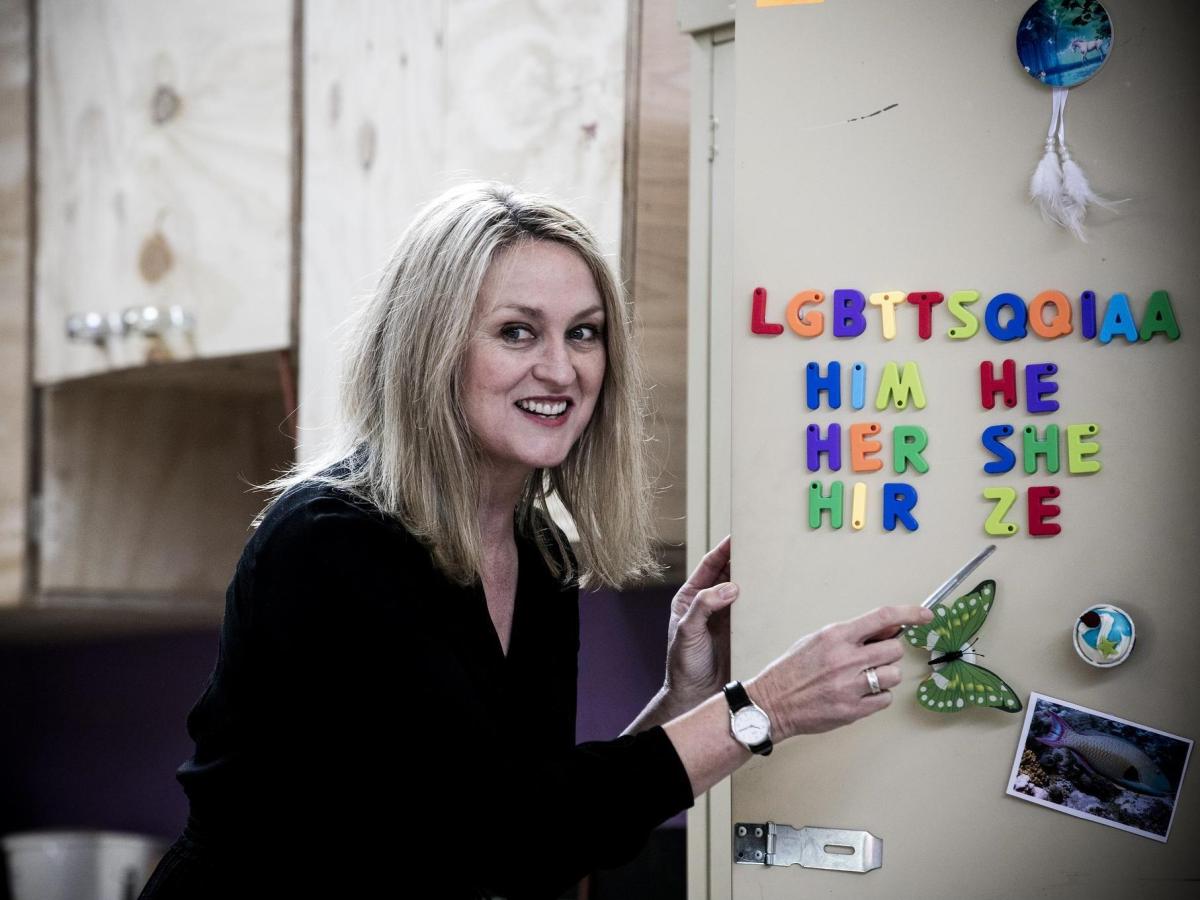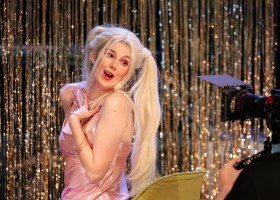Image: Helen Thomson in rehearsal for Belvoir’s production of HIR, by Taylor Mac. Photo by Brett Boardman.
A damaged son comes home from war to find his family home in chaos. His younger sibling is transitioning from female to male; his domineering father has had a stroke; his mother is revelling in the new-found power she now wields over the husband who used to beat and bully her.
Anthea Williams, who is directing Taylor Mac’s Hir for Belvoir, describes it as ‘a beautiful family play about a dysfunctional family’. Dramatically, she says, it sits comfortably alongside such American staples as Sam Shepard’s Buried Child and Tennessee Williams’ The Glass Menagerie.
‘It’s a really beautiful look at what’s happening in our society, what’s happening in our families now,’ Williams says. ‘It’s about class and about urban blight and young people who perhaps don’t sit within the traditional gender binaries. It’s about people who need to leave their small towns, but what happens to those small towns when people keep on leaving them?’
Mac – a Pulitzer Prize-nominated playwright and performance artist who prefers the non-gender-specific pronoun ‘judy’ – consciously references the American theatrical canon in Hir, but the play also explores the dramatic cultural shifts which have taken place in the West in recent years.
Lead actor Helen Thomson explains: ‘Whereas once upon a time the young soldier would have been the central character – the homecoming hero – in this play he’s got post-traumatic stress disorder and he’s a mess-up. The great hope in this play is the trans child. There’s a paradigm shift.
‘My character Paige has been a victim of physical abuse in this marriage and now her husband has had a stroke and I’m the dominant character. She’s reinventing herself and has got herself a job and she’s really positive, but she’s actually damaged as well because of all of those years of abuse. So there’s a lot of big topics there.’
Dramatically, Hir ‘turns on a dime,’ says Williams, spinning from comedy to drama in seconds, a trait she attributes to Mac’s unique personal aesthetic.
‘When you see Taylor perform, something that’s funny or light-hearted one moment so quickly becomes absolutely real and very, very personal and then jumps out of that to being a joke again. It’s completely remarkable how the play does that. Because Taylor is a writer and an actor and a performance artist, the work has a quality that you don’t often see,’ she says.
‘I mean, when I read this play, I immediately wanted to do it – I thought it was hilarious, and it was just a complete world that had been created. But it was also such a dynamic piece … There’s also the use of old tropes, like kitchen sink drama, and there’s elements of farce, and it very much sits in the canon of American family plays.’
Hir also gives voice to the death rattle of the American dream, Williams adds.
‘I don’t want to bring up “the T-word” but this play was written and performed before Trump was in power, and you look at someone like [the character of] Arnold and he’s so angry; he feels like all of his rights have been taken away but actually he’s really privileged. He just feels like the archetypal Trump voter,’ she says.
‘And now that Helen’s character Paige is able to run the family, everything that makes those men in her family feel safe is being taken apart, but ironically it’s now a space that she feels safe in.’
Learn more about Taylor Mac’s Hir at Belvoir
While Paige now feels safe in her home, it’s also essentially somewhere she and her family are trapped, says Thomson.
‘Because they have no resources they’re kind of stuck in this little starter home, as they call it; we’d call it a pre-fab home. Basically a trailer park. It’s the house that Paige and Arnold started off the marriage in and they’re still in it, 33 years later – and they’re even fighting to keep that roof over their heads. And you think, “What would become of someone like that? What if they can’t pay the mortgage?” You can see that right across America – people who had to leave their houses, whole suburbs empty because people couldn’t pay their mortgages. It’s frightening.’
Hir explores everything from the downfall of white Western masculinity to the anger of Trump’s “forgotten Americans”, but Williams is at pains to emphasise that the play is not a polemic.
‘It’s so funny. It’s absolutely hilarious. But it’s brutally, darkly comic,’ she says.
Thomson agrees. ‘It’s called a comedy and it doesn’t have a particularly happy ending but people will be laughing the whole way through it. It’s really funny.’
She compares the play to a twisted sit-com. ‘You’ve got a mum, dad, two kids and one set … but Taylor is chucking in some really deep problems that the characters have to cope with. As a playwright Taylor is very clever, very current. The play will make you laugh but also make you think. It’s unusual to find such strong subject matter that can also make you laugh. I think that’s a gift.’
Taylor Mac’s Hir
Upstairs Theatre, Belvoir
12 August – 10 September 2017
belvoir.com.au/productions/hir/






